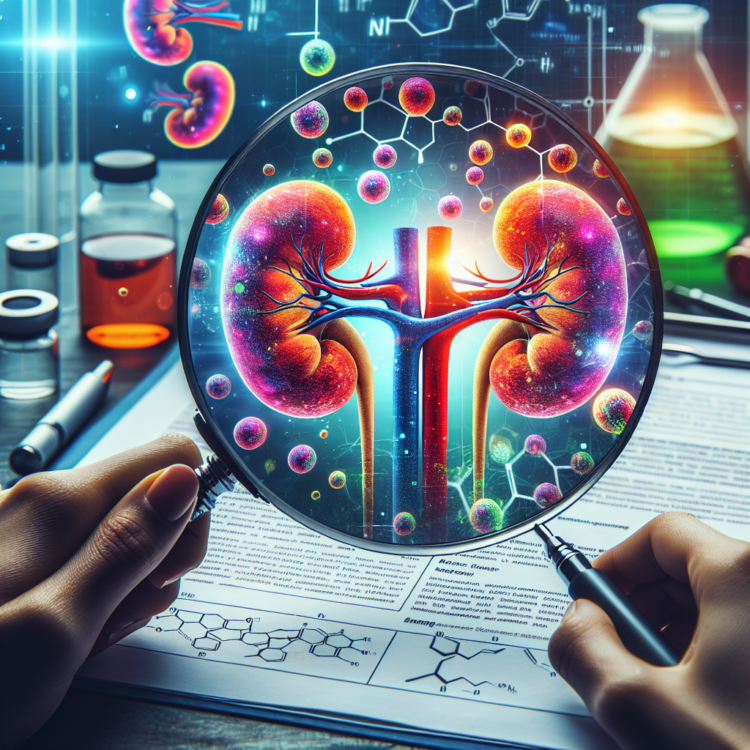LOS ANGELES — In a paper published today in Science Translational Medicine, researchers from City of Hope®, one of the largest cancer research and treatment organizations in the United States and a leading research center for diabetes and other life-threatening illnesses, report that they have discovered advances in predicting kidney failure in type 1 diabetes (T1D) patients.
LOS ANGELES — In a paper published today in Science Translational Medicine, researchers from City of Hope®, one of the largest cancer research and treatment organizations in the United States and a leading research center for diabetes and other life-threatening illnesses, report that they have discovered advances in predicting kidney failure in type 1 diabetes (T1D) patients.
By performing the first epigenome-wide association analysis in patients with diabetic kidney disease, a team led by Rama Natarajan, Ph.D., deputy director of the Arthur Riggs Diabetes & Metabolism Research Institute at City of Hope, identified novel associations between DNA methylation activity — a biological process that can change the activity of a DNA segment — and a subsequent risk of developing kidney failure in a number of years.
T1D, which affects an estimated 9 million people worldwide, is associated with a significantly increased risk for kidney disease, which can progress to kidney failure. Failure of the kidneys requires dialysis or renal transplantation and results in higher rates of illness and death for T1D patients.
“It is therefore critical to find mechanisms leading to kidney failure in diabetes, as well as biomarkers of early detection to facilitate prompt intervention,” said Natarajan, who is a corresponding author on the paper and a pioneer in diabetes epigenetics.
Epigenetics is the study of how behaviors and the environment can cause reversible changes to gene expression and activity without changing DNA sequences. Methylation — which was investigated in this study — is a type of epigenetic change that can alter gene expression and lead to disease.
To identify regions of the human genome — which comprises the body’s complete set of DNA — where epigenetic DNA methylation was associated with risk of kidney failure in T1D patients, the team of international researchers used blood samples collected from 277 participants in the Joslin Kidney Study, a decades-long study of diabetic patients. All the patients whose samples were analyzed had diabetic kidney disease at the start of the Joslin study and roughly half had progressed to kidney failure during a follow-up period of seven to 20 years.
“Where we were able to pinpoint key locations of kidney failure-associated DNA methylation variations, these biomarkers remained remarkably stable in the same person with T1D over several years,” said Natarajan, the National Business Products Industry Endowed Chair in Diabetes Research. “We were also able to provide valuable insights into the molecular mechanisms related to DNA methylation that are linked to major clinical conditions associated with kidney disease and kidney failure.”
Natarajan said the team found links between DNA methylation and other markers associated with kidney failure, including genetics, circulating proteins and noncoding RNAs by performing multiomics integrative analyses, which integrates different types of data to understand their combined influence on disease processes. In addition, because the researchers were able to make such strong associations between DNA methylation and kidney failure using just blood samples, their findings could pave the way for a new prognostic test for T1D patients with kidney disease.
“We demonstrated that DNA methylation at some of the genomic sites identified can be used as noninvasive biomarkers to improve the prediction of kidney failure,” said Nancy Chen, M.D., M.S., the paper’s first author and assistant research professor in City of Hope’s Department of Diabetes Complications & Metabolism. “This has important translational implications for early detection and prevention of kidney failure in at-risk patients with T1D,” Chen said.
The researchers plan to do additional experimental studies to examine and verify the potential molecular mechanisms identified in this study that are associated with progression to kidney failure in patients living with diabetes. They plan to validate their findings in larger cohorts of both type 1 and type 2 diabetes patients, with the aim of developing a risk score test for predicting kidney failure in diabetes using several epigenetic biomarkers.
“In the future, DNA methylation at the identified genomic locations could not only be used as biomarkers to predict kidney failure development but could also be targeted to prevent diabetic kidney disease progression to kidney failure, which is a major unmet need in the field,” Chen added.
The Wanek Family Project for Type 1 Diabetes at City of Hope and the National Institutes of Health’s National Institute of Diabetes and Digestive and Kidney Diseases helped fund the research.
# # #
About City of Hope
City of Hope’s mission is to make hope a reality for all touched by cancer and diabetes. Founded in 1913, City of Hope has grown into one of the largest cancer research and treatment organizations in the U.S. and one of the leading research centers for diabetes and other life-threatening illnesses. City of Hope research has been the basis for numerous breakthrough cancer medicines, as well as human synthetic insulin and monoclonal antibodies. With an independent, National Cancer Institute-designated comprehensive cancer center at its core, City of Hope brings a uniquely integrated model to patients spanning cancer care, research and development, academics and training, and innovation initiatives. City of Hope’s growing national system includes its Los Angeles campus, a network of clinical care locations across Southern California, a new cancer center in Orange County, California, and cancer treatment centers and outpatient facilities in the Atlanta, Chicago and Phoenix areas. City of Hope’s affiliated group of organizations includes Translational Genomics Research Institute and AccessHopeTM. For more information about City of Hope, follow us on Facebook, X, YouTube, Instagram and LinkedIn.
Journal
Science Translational Medicine




